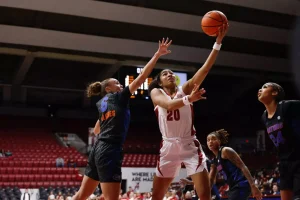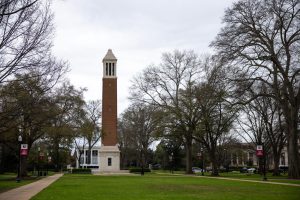Students, organizers look back at Tide Loyalty Points
March 2, 2020
When the inaugural season of the Tide Loyalty Points program was announced in August, the response from students was mostly optimistic.
But in the six-plus months since the program and its corresponding mobile app made their debut, the reaction has been more mixed.
Early issues, like complications with the app and long lines at the kiosks intended to assist students with those problems, made some students skeptical. Alabama Athletics released a statement afterward, acknowledging the issues and committing to increasing the app’s server capacity.
Athletic director Greg Byrne said on Sunday that he was “pleased” with the program overall.
“In addition to the technical aspects, we realized early on that we needed to address specific concerns such as unsafe weather conditions or potential extended interruptions in play, which we did,” Byrne said through a spokesperson. “We feel much better about where we are now as we head into year two with Tide Loyalty Points.”
In response to student concerns about the Wi-Fi in Bryant-Denny Stadium, Byrne said the issue was never related to connectivity, but rather the app’s servers. He said he expects lines at the kiosks to be significantly shorter in 2020 due to the app being better equipped to handle the demand and an “Appeals” page that has been added to the app.
Students were also concerned about the program’s point distribution, which awards 100 points per Alabama credit hour earned – the same amount awarded for attending each football game.
Those who disapprove of the point structure say it over values seniority and undervalues attendance and school spirit. Senior finance major Dillon Harnage said in a response to a Facebook post on the Alabama Student Ticket Exchange page that “it doesn’t matter” how many games students attend because seniors have a points advantage that is “impossible to [overcome],” but Byrne said that effect will become less pronounced over time since points carry over to subsequent years.
“Freshmen become sophomores, then juniors, then seniors, and those attendance points will continue to add up as the program matures,” Byrne said. “With everything, we continue to evaluate and evolve, as needed.”
Students also receive 350 points for staying until the fourth quarter: 75 for donating their tickets by Wednesday at 5 p.m. and 25 for donating by two hours before kickoff. Discussions about the points distribution, according to Student Government Association president Harrison Adams, center around getting tickets to students who are most likely to use them.
However, Kristina Woodward, a junior majoring in international studies and German, said on Facebook that she believes the removal of the penalty points system allows students to upcharge when selling tickets because they’re no longer forced to get rid of them.
Adams said there’s currently no plan in place to prevent tickets from being sold, but there have been preliminary discussions about ways for the athletic department to get more tickets to students who will use them rather than transferring them.
“One of the approaches that could be possible … is see who’s exchanging tickets the most,” Adams said. “And if they’re just actively seeking to make money off selling tickets and not supporting the athletics program, I think you could see, possibly, maybe a way for the athletics department to stop giving tickets to people who do that.”
In response to a question about the potential to upcharge, Byrne confirmed that while the intent of Tide Loyalty Points is to reward, not penalize, there are some areas that will be discussed for further improvement.
Adams said the program isn’t perfect and may not ever be, but its goal will remain the same: to enhance students’ game day experience without overstepping boundaries.
“It’s definitely a work in progress,” Adams said. “But I am 100% an advocate because it is a better system than what we had.”










